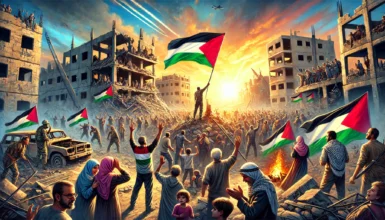
The International Commission “Hashd” published a study paper titled “The Concept of Transitional Justice Its Origins, Mechanisms and Ways of Implementing It to the Palestinian Situation”
Reference number: 91/2023
Date: September 21, 2023
Native language: Arabic
Press release
The International Commission “Hashd” published a study paper titled “The Concept of Transitional Justice, Its Origins, Mechanisms, and Ways of Implementing It to the Palestinian Situation,”
The International Commission to Support Palestinian Rights “Hashd” published a study paper titled “The Concept of Transitional Justice, Its Origins, Mechanisms, and Ways of Implementing It to the Palestinian Situation,” written by lawyer and human rights activist Dr. Salah Abd El Atie.
The paper emphasized that societies throughout history have been subjected to divisions, civil wars, and a wide variety of crises and problems, all of which have had disastrous effects on the internal relations of these societies, jeopardized citizens’ rights and freedoms, and added a kind of confusion and faltering to their external movement. However, these societies quickly corrected their situation, and their people banded together to eliminate these violations and problems through a variety of mechanisms, most notably what has come to be known as transitional justice, which the paper discussed in terms of its concept, origins, working mechanisms, as well as its use in the Palestinian situation.
According to the paper, transitional justice focuses on at least five tactics or approaches to confronting past human rights violations, which are trials, truth-seeking, and fact-finding, compensation (whether through moral or in-kind compensation or rehabilitation), institutional reform, and reviving “collective memory,” noting that the mechanisms and approaches of transitional justice work in close integration to put an end to ongoing human rights violations, investigate and prosecute perpetrators, and rehabilitate victims. Both personal and national.
The paper discussed the benefits of transitional justice, the dangers of prioritizing human rights rhetoric while applying transitional justice, and how to apply transitional justice to the Palestinian matter.
According to the paper, the present Palestinian landscape is plagued by major political, sociological, economic, cultural, and intellectual imbalances and crises that impede its growth, freedom, and attainment of national rights. The environment of political turmoil and division has thrown a dark shadow on rights and liberties since recent years have seen a significant erosion in values. Instead of a culture of tolerance, democracy, the rule of law, and human rights, sectarianism, fanaticism, and violence were strengthened, manifesting as serious violations that constituted a clear assault on personal and public freedoms, as well as a serious violation of most international legislation and laws issued by national authorities that regulate and protect human rights and freedoms.
According to the paper, the number of violations monitored by the Independent Commission and other human rights organizations demonstrates the dangerous reality that the Palestinian territories are experiencing, confirming that Palestinian society is exposed to a dangerous disease that must be treated quickly to prevent its aggravation and transformation into a chronic disease that prevents Palestinian society’s ability and attention from confronting the dangers of the occupation.
This prompted the paper’s author to inquire about the link between Palestinian political philosophy and human rights breaches. And raising numerous concerns that cannot enhance society’s existence and prosperity unless they are resolved in a constructive and right manner, as it highlights key points, the most important of which is the Palestinian political system’s crisis. And what about the thorny connection between authority, law, and society? And what about the peaceful transition of power, as well as attaining national agreement and societal reconciliation? What are the strategies for confronting past human rights crimes and preventing future violations?
Abd El Atie feels that breaching citizens’ rights and denying them their liberties is a major threat. Anyone who reads about the changes taking place in the Arab world and the revolutions of peoples for freedom and dignity and against tyranny and oppression, as well as the history of contemporary peoples, realizes that the path of modern civilizational progress was linked to the advancement of the conditions of freedom and justice, that is, to the success of societies. In extracting and enshrining greater freedoms and rights, pluralism, diversity, the right to differ, to strive, to freedom of expression and peaceful assembly, to freedom of worship, to the right to create unions, organizations, parties, and groups and to join them, to participate in governance, to internationalize power and social justice must be protected in any society, otherwise, the pillars of civil peace in it will be exposed to damage and Destruction.
In the field of transitional justice implementation, the Palestinian experience allows us to be the first Arab experience that places human rights and human rights activists in front of complex situations so that we face one of the most difficult tasks, which is ridding society of internal and multiple human rights violations – which there is no need to list, as they are monitored and documented by the Commission. Despite the confirmation of the Palestinian Basic Law, the Independent for Human Rights and all other human rights groups must take a reasonable and fair approach to the issue of responsibility and compensation for victims, as well as have the correct vision to confront a lengthy heritage of breaches. according to Article 32, “every assault on the rights and freedoms guaranteed by the Basic Law.
The facts and circumstances pointed out the need to consider how to solve the following dilemmas:
1- We are confronted with an exemplary case of abuse and previous and subsequent human rights violations, with the difficulty of holding accountable people who have committed multiple crimes and violations and who are now in positions of power and influence, and with the fear that we will fall into the trap of holding small fish accountable while protecting the big whales.
2- The absence or disruption of independent institutional mechanisms tasked with enforcing the rule of law and upholding justice, which takes time to restore and activate. Justice cannot be attained until the roots of right and freedom are entwined, and any attack on them is a total deconstruction of the foundations of democracy and the pillars of civic peace.
3- Providing justice and dignity to victims and their families via the establishment of independent inquiry committees and an independent judiciary that follows the rules of justice and human rights standards.
4- Relations between all Palestinian parties still require in-depth and courageous dialogue to create a formula that respects victims’ rights, assures rights and freedoms, and promotes democratic ideals.
5- The failure of reconciliation methods and elections, as well as the continuation of exclusivity in public affairs management.
The paper concluded by emphasizing that, despite all of the previous challenges and many others, it appears to us that transitional justice, with all of its values, standards, and approaches, is the panacea and the ideal way out for our Palestinian society in the painful reality that suffers from the dominance of the logic of intolerance, a lack of internal confidence, and increasing violations of rights and freedoms, and to end the division and ensure unity and civil peace, therefore, it is necessary to denounce all attempts to leap over the workforce aimed at restoring unity and building a democratic system in the Palestinian society that lives under occupation and cannot tolerate any delay in giving citizens their rights. Injustice and dignity before continued violations and oppression force them to rebel and use violence again in a way that may threaten the future of Palestinian society and its national cause.
The paper presented a proposal for a draft law for the National Reconciliation Committee and its work to contribute to Palestinian national reconciliation and stability by adopting the transitional justice approach and the foundations of justice and fairness for victims, with the hope that this proposal will gain the importance required by the presidency, the Legislative Council, political forces and parties, and civil society institutions in Palestine. Human rights campaigners, victims of abuses, and their families.
Finished.
To read the paper in Arabic click here:





